|
The prompt today was a delightful challenge, for a change: a prose "sonnet" -- a story in fourteen sentences, grouped in some way. I chose the Shakespearian arrangement, 4-4-4-2. The first grouping is from Genesis, as it appears in the King James version. It is more than 4 sentences, but I don't care. Abel and Cain
8 And Cain talked with Abel his brother: and it came to pass, when they were in the field, that Cain rose up against Abel his brother, and slew him. 9 And the Lord said unto Cain, Where is Abel thy brother? And he said, I know not: Am I my brother's keeper? 10 And he said, What hast thou done? the voice of thy brother's blood crieth unto me from the ground. What were they doing in that field, I wonder? “Cain talked with Abel”, but did Abel talk back? Or did he glower at him, his face dark with anger? Perhaps Abel laughed scornfully, shook his head, and turned his back. Imagine instead that Abel put his hand on Cain’s shoulder. That he said “Please, don’t say that, brother”. That he said “I would never do that to you”. That Cain saw the truth and was sorry. God would be so relieved. Instead of endless parables about fratricide, he could create cicadas with wings like butterfies.
0 Comments
Today's prompt was to embed a hidden message in a story or poem. I took the easy way out, so you should have no trouble finding it! 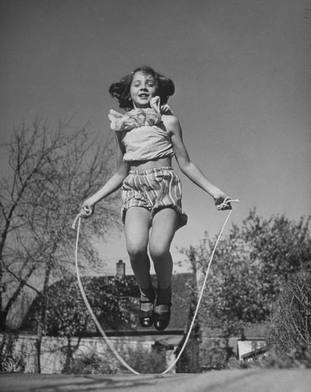 Skipping rope in Milwaukee, WI, 1950. Life (via Google Images) Skipping rope in Milwaukee, WI, 1950. Life (via Google Images) The secret of my success Maybe you need a break; Also, a cup of tea. Keep this sage advice, Easy as can be. When you push too hard, Or strive to be a star, Remember that “all play” Kept Jack from going far. Pause every twenty minutes, Laugh, or dance, or sing. A little levity in work You need to give it ZING! I used to work in a different department on the same campus. We were tops; more research grants, more PhD students, more publications than any other unit in our college. We attended graduation together, watched the Super Bowl together, and, when threatened by outsiders, defended ourselves and each other with loyalty and absolute sincerity. But in a period of about five years, we went from a powerhouse department to a scattered band of former colleagues. For years, I have joked that when I retired I would write the story of how it happened, but it would have to be disguised as a murder mystery. Today's prompt was to turn all or part of a story into a list. So here is mine: Don't worry; it's not entirely true, and if you think you are on the list, you aren't.
For the faint of heart, a word of reassurance: Academic murder isn't real murder. And a caution for everyone: this works for killing other social groups, too. Today's prompt was a personal challenge. Write a story (set in your novel’s world) that makes sensation a priority. Use all five senses. I am not generally good at descriptions, especially of sensations. When I took a storytelling class last year, the leader gave us a similar prompt, and I remember about the experience was how I struggled with it. Anyway, here goes nothing. Anna woke up to a stuffy nose, dry mouth and sharp pain in her throat. It hurt to swallow; what if she lost her voice? Luckily, she’d brought a supply of her favorite licorice-flavored herbal tea with her. Tilting back in the creaky recliner, she sipped the scalding tea and was about to consider alternate plans when she heard an unmistakable sound. First faint, then louder, then filling the room: the slightly discordant, full-throated cry of a steam whistle. Engine 844 was making its way into North Platte!
Half-running the three blocks to Front Street the hot tea occasionally scalding her hand, Anna joined the swarm of North Platters converging on Front Street to look and listen and take pictures. In spite of the pre-dawn chill, it was the biggest crowd she had seen anywhere the entire week! There were scores of children, many riding the shoulders or father and grandfathers who regaled them with personal stories. “Grandpop used to work on those!” “I built engines just like that!” “When I was little, I saw these everyday from my backyard!” The great black engine was on a siding just beyond chain link fence, now and then exhaling a hissing cloud, or even a shriek of steam, to the delight of the children. It was scheduled to depart at 8:30, but the hour came and went with no sign of movement. The retired railroaders in the crowd offered various explanations and argued genially about the likely reason for the delay. Anna eavesdropped and sipped her tea, which had grown cold but was still somewhat soothing. Her head was clearing, and she could even breathe through her nose again. She sniffed the cold morning air, and then inhaled deeply the mingled smells of steam, oil, alfalfa from the surround fields, and bacon wafting from the diner next to the tracks. The sun came up and still the engine sat. The crowd thinned, as work and school beckoned. Anna was about to head back to the motel, when a chuffing sound and a piercing whistle announced that Number 844 was about to move on. Slowly, it backed along the siding, almost out of sight beyond the Poplar Street viaduct. Then, another whistle, and another, and the thunder of her steam-powered driving wheels, each taller than most men, and the mighty machine headed toward Cheyenne and was gone. Anna sighed and glanced around. Across each face was a broad grin. Today's prompt: Write a story focusing on an aspect of society that matters to you/your story. This phone call was getting awkard.
"I feel kind of weird just leaving her alone. Though Peg will be here, as usual. But people expect..."John paused. Carl laughed. "Since when do you care about what people in North Platte expect? Oh, that's right. Since puberty. Nice cushy closet you've built for yourself, buddy. No one would suspect --" "That's enough. You wouldn't know what that's like. North Platte isn't Denver." "No, and Denver isn't Sunderland", Carl replied, gently. He'd come out to selected friends in high school, to his brother and sister in college, and to his parents a few years later. Being gay in a small, conservative town required a delicate touch, and a willingness to take risks. "And I am not you", John said firmly. "Just as well", he heard Carl say, and he could imagine his smile. "So here's a thought: why don't I come there?" John hesitated, and Carl added, "We've done it before. Your old college buddy, Carl. No holding hands, just two old straight dudes watching the Huskers over wings and beer." "Well..." "And I could help out. She's bound to need some physical therapy after being immobile for so long. Let's at least try. And I miss you." John relaxed and nodded, cradling the phone in both hands. "I miss you, too. Come on, as soon as you can get away. We'll just have to be careful around her." Carl chucked. "Sure. But who knows what she's overheard the other times I've been there? People in comas aren't completely unconscious --" "Jesus, Carl! Don't remind me!" "See you on Friday." This part takes place later; I have not written the stuff in between. Anna peered at them and shook her head. They had the buddy routine down to a science, but she wasn't fooled. Would she just come out and say it, or have some fun. Have some fun it was. "You married, Carl?" "Nope. Carefree bachelor, just like John". "Well, John's a special case, isn't he? He's got me, all these years. I'm a lucky girl." Carl fidgeted a bit, but quickly reverted to his cheery self. John looked away, nervously. "Yep", Anna continued, "I'm truly blessed. A veritable Sleeping Beauty, opening her eyes to see her old Prince Charming waiting faithfully for her. So blessed." She gave John her best goo-goo eyes, enjoying his obvious discomfort. "And now it appears the whole town is waiting for the engagement announcement. Right, John?" John wet his lips and opened his mouth, but nothing came out. Today's prompt: Write a story that focuses on the discovery/invention/ramifications of something that shapes your characters’ physical world. Lying in the dark, Mary conjured up a memory of her Willow Street bedroom. It had been bigger than this room, or possibly it just seemed that way because it was square, instead of oblong. She strained to remember the color of the walls, but could not. Only three features stood out in her mind. There had been a long, narrow horizontal window above her bed, or rather a niche that had once been a window. It had been boarded up and painted over long before her family had moved in. Her mother’s suggestion was to use it to display Madam Alexander dolls, if she ever got any. Some of her friends had doll displays in their rooms, all the little figures lined up with their fancy dresses framing their bodies. Grandma had sent a fashion doll for last Christmas, but Mary had found it dull — only the arms moved, and the clothes were attached — so she had traded it to a neighbor girl for a pretty basket she’d fancied. So the “unwindow” had stayed empty.
The real windows in the room looked out from the front of the house, from the porch to the street and to Peggy’s house across the way. On summer evenings, she’d gone to bed when it was still dusk, and she would sit curled on the foot of the bed, her chin on the windowsill, imagining dinosaurs walking down Willow Street. It was a scary but delicious thought. But her favorite part of the room was the French doors. They were covered with dark green curtains, and usually only one side opened. Still, when Mary was sick in bed — like the time she had the measles — both doors were opened wide and the room became part of the living room. Mary smiled, thinking of the lives her little room had once had. She imagined it as a parlor, with a tall piano under the high window, which perhaps had a pretty stained glass panel. The French door, without the drab heavy curtains, would be wide-open to the rest of the house, its dozens of glass panes sparkling. And there would be visitors on the front porch, chatting on a swing, which listening the sounds of the piano through the open window of the parlor. “When I grow up”, Mary thought, “I will buy the house, and a piano, and a porch swing, and make the room happy again”. I am a grading machine today, so there's only time for a very, very short story.
Tic-tac-toe was Mary's favorite game. Every night she and Daddy would fill a sheet of paper with their matches. Then, one day she suddenly saw how easy it was. In that instant she also knew that Daddy always lost on purpose. So the next night, she tried to lose, instead. But that turned out to be harder than she expected, because of course Daddy was also trying to lose, so they played to a draw. After two more games, he looked at her, puzzled, and then smiled. "I think you are ready for checkers, kiddo." There is a moment in every story where a protagonist has to make a choice: to take up the challenge of the story or to turn away. Everything else flows from that. Today, write a story in which your protagonist makes the other choice. Helen rose from the table and began to clear the plates. Chet touched her elbow as she leaned past him, “I heard from Riley.” She glanced at Jimmy and Mary, still at the table. Mary was picking at the pile of green beans on her plate; Jimmy was downing the last of his glass of milk. “May I please be excused”, he said, pausing for a swallow. “Go play”, Helen nodded, and the children slid from their chairs and scooted to their bedrooms. Through the open door, Mary could hear her parents’ voices, first cautiously lowered. “Well?” Helen asked. “He’s made an offer. It’s not as good as I would have liked, but there’s a chance for a raise in six months.” “And…?” “I accepted. I start in six weeks.” Helen’s voice rose. “Six weeks! How can we possibly sell the house, pack, and move in six weeks? And school starts Tuesday. We agreed that if this didn't come through, you would wait and start looking again next spring.” “Well, it has come through, and we’re moving.” Chet’s tone was flat and hard. “Moving!” Mary shouted from the bedroom door. “Where, Daddy?” “Whoops! The cat’s out of the bag, Helen. They might as well know.” Jimmy peered out from his own bedroom, a boxcar in one hand and a piece of track in the other. He looked stunned, while Mary was aflutter with excitement. Chet pushed away from the table and leaned toward them in his chair. “I have a new job — in New York!!” New York! “The Empire State Building!” Mary said, clapping her hands. Jimmy was silent; in his ten years, they had already moved five times, and he’d gone to three different schools. Moving had no appeal. “You and Mommy will stay for a while with Pop-pop and Grandma while I look for a new house, but then you can see the Empire State Building. And the Rockettes. And the Macy’s Parade.” Mary was bouncing up and down, a big grin on her face. “I’m not going”. Startled, Chet looked at Jimmy and opened his mouth to reply. “No, you’re not”. Helen wiped her hands on her apron and clasped her hands near her mouth briefly before adding, “Daddy can go where he wants. We’re staying here." Fifty-nine years. Anna shook her head. It was that long ago that the family’s ’49 Chevy had pulled away from the driveway of the little white stucco bungalow on Willow Street and headed east. She had been eight then, waving cheerfully to her best friend, Peggy, as if they were going on vacation, not moving away. Forever, as it turned out. First, to New Jersey, where Anna had cried into her pillow every night for four miserable, homesick years. Then to a small town in Connecticut — better, but not Nebraska. By that time, she had known not to share memories of North Platte with her middle school classmates. The name always made them laugh, as if she had just said “Hayseed City”. Suddenly, the roadside sign said “North Platte 155 miles”. It was really happening; she was going home. Maybe not exactly home; it was, after all, just a month-long visit, and then she would head back to Maryland, where she had lived for forty years but never felt at home. Would she feel at home in North Platte, after all this time? Certainly the town had changed, but so had she. Anna grimaced to herself, keeping her eyes on the highway as it narrowed into a perfect image of one-point perspective. The drive from Denver to North Platte — about three and a half hours, according to Google Maps — was already new. When the old Chevy had taken the family to vacations in Estes Park, they had followed the South Platte River on what passed for a highway in the early 1950s, before the interstate system had been finished. There was a time when she could have imagined returning to North Platte on a Union Pacific train — the City of Denver, perhaps. But passenger service to the city had been abandoned decades ago, and now her choice had been a flight to Denver or Omaha, followed by a three or four-hour drive in an expensive rental car. The landscape near Denver was crowded with new buildings, but the Front Range of the Rockies still rose up in the west, as always. Little by little, the mountains faded on the horizon, first masquerading as clouds before disappearing completely. Then the highway was bordered by range land and farms stretching for miles on either side as Anna slowly descended from the Mile High City to the foot hills and the High Plains. Her friends often dismissed the landscape as boring and flat, but Anna saw it as beautiful and dramatic, dominated by sky and clouds.The hills rolled very slowly, rising and falling gently, almost imperceptibly. Then, after an unusually long incline, Anna crested a hill and saw the plains in the distance, looking like a golden ocean. She gasped aloud, as tears filled her eyes. So beautiful! How had she forgotten? Far from being impatient with the drive, Anna, wanted to savor it. She stopped at every rest stop to use the facilities (the gift of old age) and to take pictures. At one spot, she opened to car door to the unmistakable sweet odor of cow manure. How could anyone find it unpleasant, she laughed to herself. That and alfalfa, the sure signs of cattle country. Soon enough, she was speeding east on Highway 80, past the exits for Ogallala and Hershey, and then coming up on North Platte. Her excitement grew as she pulled off the interstate and turned north on Jeffers Street. She knew that the old decorative archway proclaiming North Platte as the Home of Buffalo Bill Cody was long gone, but hadn’t expected the visual confusion that had replaced it. Chain hotels and restaurants on every side, a shopping mall, and — to her horror — a Starbucks. The Walmart she had expected; hadn't every town in America succumbed to the Walton family”s seductive wares? She stayed on Jeffers, knowing exactly where to stop first. It was too early to check into her room, and not time for dinner. She passed the library where she and her brother had played with Legos, but the sign said “Children’s Museum”, so that was changed. Before she knew it, she was on the viaduct that carried Jeffers over the Union Pacific tracks, and she glanced to the east to see the grand old train station. It was gone. Instead, there was a strip mall and a huge parking lot. Ok, so there were no more cross country passengers, but couldn’t they have kept the station and turned into — something? She drove on, barely glancing at the buildings on either side on the street. Most were new; the old ones were unfamiliar. Wasn’t there a movie theater on this side of the tracks? What else was there? She suddenly felt that the trip had been a horrible mistake. She was going to spend a month as a stranger in a strange town, in the middle of nowhere. But then she saw it — a swimming pool. THE swimming pool! Closed for the season, but still there, and a few yards past the pool as the entrance to Cody Park. She’d never driven there, of course, so the winding road could not be familiar. but there were the kiddie rides, and the carousel — closed for the winter, but obviously still in use. Then the small “zoo” — actually just pens with antelope and other local species. Wait, was that a llama? Well, that was new. The road curved around and she saw the North Platte River. The water was high — the sandy banks where she once had played were flooded. But the smell was the same. Proust can have his madeleines, she thought. I’ll take alfalfa, manure, and the silty waters of the Great Plains.
Walking along the river, Anna once more felt her eyes fill with tears. Good thing she was wearing sunglasses, she thought with embarrassment. A heavy set man, dressed in work clothes, saw her and was strolling over. It made her a little nervous; she’d acquired an easterner’s aversion to strangers in those 59 years. “Beautiful day,” he said. “Perfect.” “Too bad the nature trail got burned,” he continued, nodding towards a blacked patch of vegetation. “Just kids, I guess.” Anna looked at the grassy spot where they stood, “There used to be swings here, I think.” He chucked. “That IS a long time ago. Well, enjoy the day,” and he turned and walked back to the road. She closed her eyes and saw the swings. They were the big, old-fashioned kind with a flat seat that you could stand on and pump your legs until you almost went all the way up and over and around. The hard kind of seat, of wood covered in rubber, that really hurt if you walked into their path. She remembered coming here after church and Daddy pushing them on the swings, standing behind and between them and pushing one swing with each hand. Fifty-nine years. He was long dead, and so was Mom. Her brother would be seventy in a few months. They had five grandchildren between them. What if they hadn’t moved? What if she had grown up here with her friends and her brother? Would their parents have stayed married? Would she have gone to college? There would have been no Steve, of course, and their children and grandchildren would have never existed. But would that have been a tragedy, if no one knew they had even been a possibility? Shaking off the thought, Anna returned to her car. Time to find the motel and check in. Today's prompt was aimed at novelists as well as short story writers: to craft a turning point in the story. Very interesting challenge. Imagine, a labyrinth in North Platte! It was just a path of crushed stone, lined with edging bricks, the kind used in landscaping. In the center were three small benches, just the right size for one person. On each one, a single word was incised: “Faith”, “Hope”, and “Love”. Anna stepped onto the path. “Oh”, she thought, “shouldn’t I have an intention first”. She hesitated, but then the word “journey” popped into her head. Wasn’t that her intention all along? To journey back to a place and time that no longer existed. And when you do that, is it even possible to know where you will end up? She paced the labyrinth, sometimes pausing to gaze up at the impossibly blue, clear sky, sometimes distracted by the man mowing his lawn in a nearby yard. She looked at the three benches in the center, as she moved closer and farther away from them as the path twisted around in its intricate pattern. She imagined her life as a jigsaw puzzle with an unknown picture. She’d found the corners, assembled the edge, and pieced together a few areas that seemed clearly defined. Now she was carefully connecting the remaining section, the jumble of colors and shapes that almost seemed familiar, but not quite. And suddenly, there she was at the center of the labyrinth, and she knew, deep in her being, that a piece was missing from the puzzle. She sank down on the bench inscribed “Love” and closed her eyes, with a sigh. Peggy turned her head. Was that the wind picking up, or was it … a sigh? She looked toward the sound and, with a shock, realized that Mary’s eyes were meeting hers, open and focusing, for the first time in fifty-nine years. “Mary?” Mary’s head tilted a bit on the pillow, and her expression changed to puzzlement. “No one has called me that since I was a little girl.” Then she was silent for a moment, wet her lips and asked, “Who are you?” “I’m Peggy, dear. I’ve been waiting all this time for you.” “Where did you find me? Did I faint at the labyrinth?” Peggy felt confused and a little panicky. “Mary, you have been here nearly the whole time since the accident.” “Accident?” Peggy started to explain, but stopped herself. Perhaps it would be too much of a shock to explain right now. Seeing Mary lick her lips again, Peggy stood up quickly. “I am going to get you some water. Just rest; I’ll be right back”. Her hands shook as she got a glass from the cupboard and filled it at the kitchen tap. “I should call John,” she thought, but then realized he would be busy with the brown bag book talk for another hour. “No, I’ll just stay here and make sure she’s ok.” At the library, John was getting nervous. The room was arranged, the coffee was made, and the projector was set up for the speaker, but Anna Whitmore was nowhere to be seen. A few early birds were already settling in, opening their sandwiches and take-out salads. He pulled out his cell phone and dialed Anna’s number. “I’m sorry,” a robotic voice answered, “ You have reached a nonworking number. Please check your listing and try again.” Maybe I should call the police, John worried. Returning to the meeting room, he glanced at the clock. Five minutes late. Maybe she was lost. He walked quickly back into the room. “Professor Whitmore is running late,” he announced nervously. “Please help yourself to coffee or tea while we wait.” “Here’s your water, Mary.” Peggy tried to say it brightly, but her nonchalance was definitely forced. She watched as Mary reached for the glass, and took a long drink. Then, their eyes met again, for what seemed like a long time. “Peggy, it’s been so long since I was Mary.” “I know, dear. But you’re back now.” “Call me Anna. I go by my middle name now. Anna Whitmore.”
|
Archives
January 2023
Categories
All
|
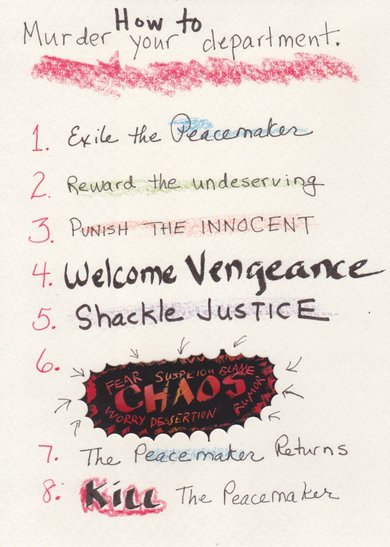
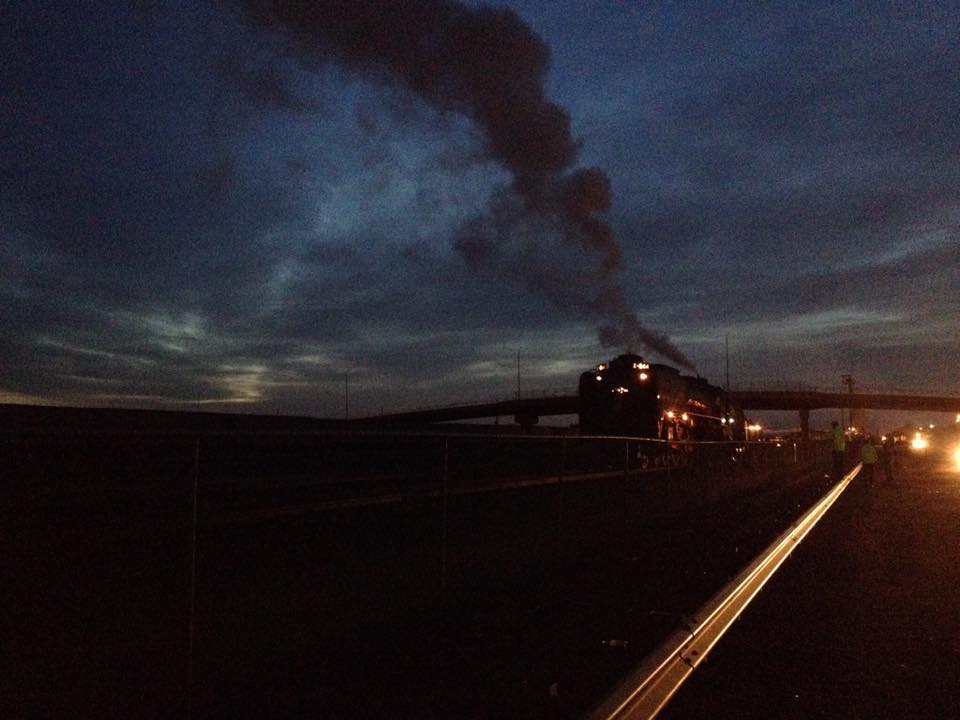

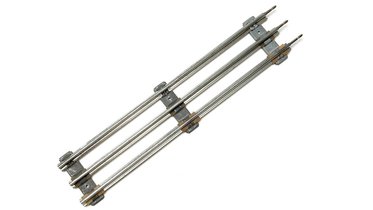
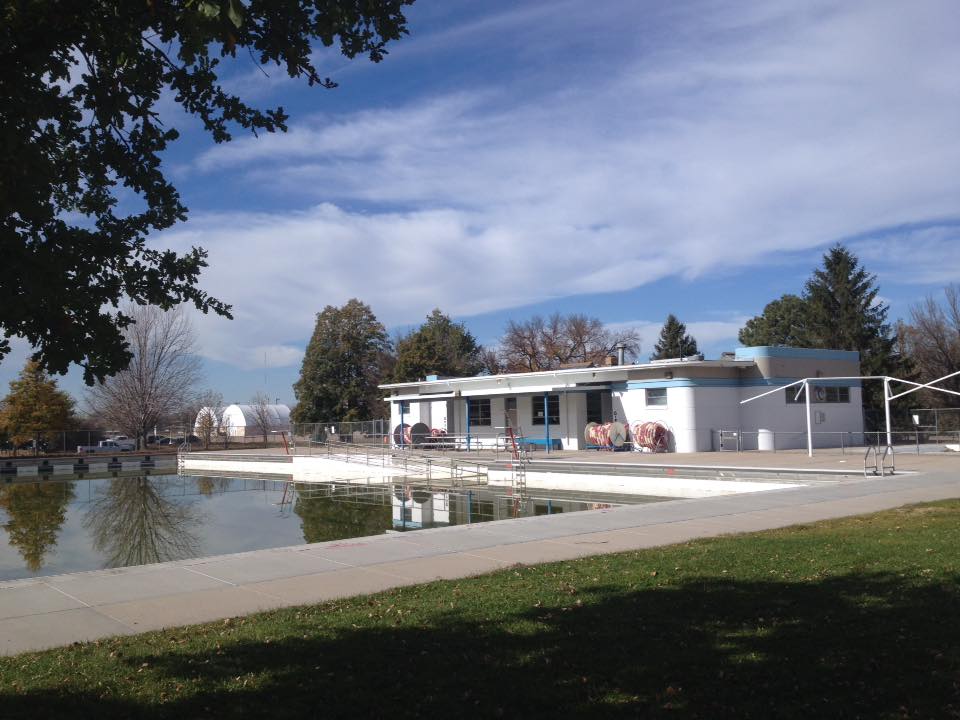
 RSS Feed
RSS Feed